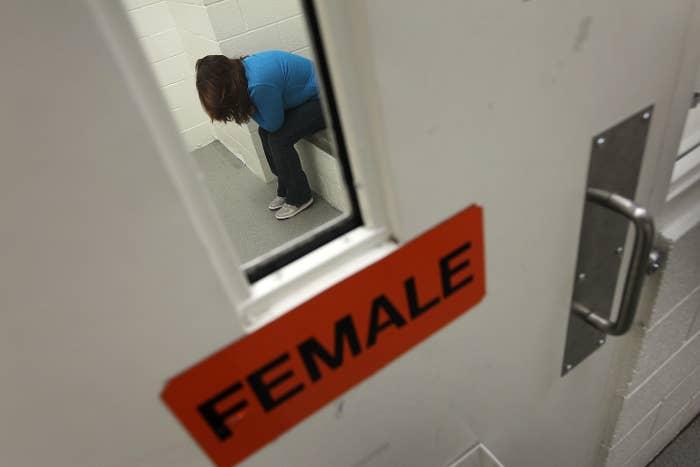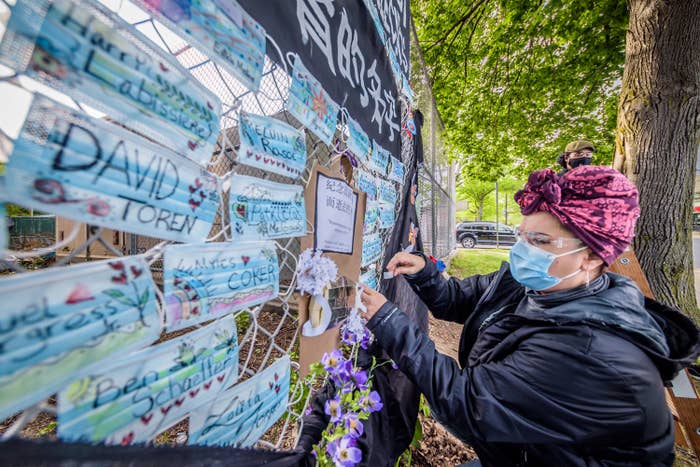DESIGNWORDS BY HEATHER SNOWDEN

GETTY IMAGES / EDUCATION IMAGES
Japan's Gundam Factory Yokohama is now the proud owner of a fucking massive Gundam robot. It's over 18-meters tall, weighs 25 tonnes, and — after years of painstaking work putting the thing together — it's now in testing mode.
The model is based on the hugely popular 1970s anime series Mobile Suit Gundam. It was due to become the Factory's centerpiece on October 1 but its official unveiling has been pushed back thanks to coronavirus. For now, a testing video of the robot taking a knee and moving its arms and fingers around will have to suffice.
According to The Guardian, the robot took six years to make, ensuring each limb met various weight restrictions so it would move seamlessly and, assumedly, not fall apart and crush anyone in close proximity.
Watch: This factory in Yokohoma, Japan is testing its 60-foot-tall Gundam robot
The robot weighs 25 tonnes and is a recreation of a character from Japanese science-fiction.
Life-sized Gundam in Yokohama is now in testing mode.pic.twitter.com/51HVoraPb7
— Catsuka (@catsuka) September 21, 2020
Big in Japan: giant Gundam robot makes its first moves in Yokohama
Humanoid robot can take a knee, no mean feat when you are 18 metres tall

It stands just over 18 metres tall and weighs 25 tonnes. And, after years of painstaking work, a life-size Japanese Gundam robot has just proved to its legions of fans that it really can move.
Modelled on one of the robots from the hugely popular 1970s anime series Mobile Suit Gundam, the huge machine was put through its paces this week at its new home in the the port city of Yokohama.
Life-sized Gundam in Yokohama is now in testing mode.pic.twitter.com/51HVoraPb7
— Catsuka (@catsuka) September 21, 2020
The humanoid was due to become the centrepiece of Gundam Factory Yokohama, south of Tokyo, on 1 October, but the virus pandemic means it will not be officially unveiled until later in the year, according to the site’s operator.
“This decision was made to ensure the health and safety of our fans and employees in response to the worldwide spread of Covid-19,” it said in a statement.
“We apologise to all of our fans who were looking forward to our grand opening and ask for your understanding. In the meantime, we will be making preparations so that all of our visitors can enjoy themselves in safety.”
Fans of the multibillion-dollar Gundam franchise, which has expanded to include films, manga, plastic models and video games, were given a sneak preview this week when a speeded-up video showed the towering creation taking a knee and moving its right arm and fingers, watched by workers on a nearby observation deck.
Engineers reportedly started designing the robot six years ago to ensure each piece met weight restrictions to prevent its limbs from buckling and that all 24 moveable parts worked seamlessly.
Despite Gundam’s military sci-fi background, the robot’s transformation from a collection of parts to fully functioning humanoid brushed with tradition when Shinto priests purified its soon-to-be-installed head in an adaptation of a jotoshiki, a roof-laying ceremony usually performed to mark the near-completion of a new building.
This 25-ton Gundam robot in Japan can move its arms and legs
It stands 59 feet tall and weighs 25 metric tons!
Bonnie Burton Sept. 22, 2020

This full-scale Gundam robot stands outside Gundam Factory Yokohama in Japan. Video screenshot by Bonnie Burton/CNET
Fans of the anime Gundam can now visit a life-size version of the robot at the Gundam Factory in Yokohama, outside of Tokyo.
According to new footage taken on Sept. 21, the enormous anime robot Gundam can move its arms, legs and torso with ease.
Life-sized Gundam in Yokohama is now in testing mode.pic.twitter.com/51HVoraPb7— Catsuka (@catsuka) September 21, 2020
Construction of the massive robot finished on July 29. The Gundam robot stands 18 meters (59 feet) tall and weighs 25 metric tons (approximately 55,000 pounds), according to Sora News 24.
The Yokohama Gundam is built with a mechanical skeleton so it can actually move its body, including its arms and legs. Engineers originally tested the movement of the robot's legs, arms and torso on July 5.
Shinto priests blessed blessed Gundam's head in a traditional construction ceremony called a jotoshiki before the head was secured to the robot's shoulders with a building crane.
This Gundam in Yokohama is Japan's second full-scale RX-78. The first stood at Tokyo's Odaiba district before being replaced by the RX-0 Unicorn Gundam.
Gundam Factory Yokohama was originally planned to open in the summer, but due to coronavirus delays, it will now open in October.
Fundam with Tokyo's giant Gundam See all photos




















